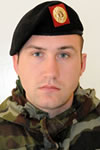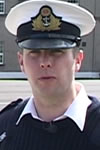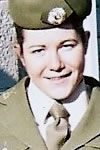Ask me a question!
What were the main 'career decision' milestones in your life so far?
The first thing that was important was to make the correct choice of subjects for the Leaving Certificate. The Defence Forces Cadetship competition requires certain subjects to be completed before application.
This is important to check if one is serious about applying. Personally, I completed a degree in Aeronautical Engineering in University of Limerick which helped with the interview process (but this is not a necessity).
During my time in college I did my work experience in Airbus in Toulouse. This gave me a good idea of what it would be like to work in the Engineering environment. I knew that this was not for me so I decided to go ahead and work on my career as a pilot. This is when I decided to finally apply for the Air Corps.
Who are the people who most influenced your career direction?
Choosing this job was entirely my own choice. Being a pilot had always been an aim of mine but I thought it would'nt have been financially feasible to follow it up while in college. This was the main reason that influenced my career choice. I also had great help and support from my family and friends.
How did you go about getting your current job?
Each year from December to February, Air Corps cadetships are advertised on National TV and the National Newspapers. Applications for this can be found online or by applying to the Defence Force competitions section.
I applied by sending for an application form and filling it in. The applications are generally due in at the end of Febuaury (the online applications are more popular now). Within one month of applying, I received a letter inviting me for fitness testing at Baldonnel. Details for the fitness test can be found in the Cadetship booklet, which is available online/career days/Defence Force competition section.
On passing my fitness test I was invited to attend a preliminary interview. This was with 3 air corps personnel and took place in Baldonnel also. This was a competency based interview, details of which is in the cadetship booklet. I was successful in the preliminary interview and was then invited to attend for Apptitude testing. This took a full day, and involved a number of apptitude tests including numerical tests, mechanical reasoning and verbal reasoning.
I was notified that I was successful in the apptitude tests and was called to the final interview stage. This includes a final interview, hand-eye co-ordination tests and a psychological evaluation. This also takes a full day and took place in PARC Aviation, Swords, Co.Dublin. It is from this stage that the final Air Corps candidates are chosen.
I was chosen in my year to be one of four cadets to be taken in. (Classes have normally between 5-10 people) I was notified on the day the CAO offers came out of my success in the process and I accepted my place. I was then called for a Medical evaluation at the end of August and started my training at the end of September.
Describe a typical day?
As a pilot in the Air Corps, a 'days work' is usually very different from day to day. We are required to fly a number of jobs each day with many different customers. Each will present different timings, a new challenge...some rewarding and some more mundane.
Our official working hours are from 9-5 but due to the nature of the job this changes regularly!! Each morning at 9am we have a morning brief. This includes a weather brief, an update of what aircraft are serviceable and a briefing on the days operations.
Each day we would have a number of flying jobs to be completed. These range from Troop transport, air ambulance, VIP transport, surveys, area reconnaissance's, etc. Generally flying crews are assigned to these jobs and are required to liaise with those involved to organise timings/locations/number of passengers, etc.
Once all is organised, the jobs will be completed as requested by the customer. Each job requires the pilots to make difficult weather calls, which can lead to pressurised decisions and some very challenging flying conditions. So each day presents a number of new challenges, pressures, and requires solid decision making. This makes the job very exciting for me!
All jobs that are completed successfully are quite rewarding! It is rare that somebody can get up in the morning and look forward to going to work...
What are the main tasks and responsibilities?
Our main day to day tasks are to fly the various jobs that are allocated to us. As mentioned before these flying jobs include VIP transport, Air ambulance, troop transport, parachuting drops and numerous reconnaissance's & patrols.
Once out on a flight, we are responsible for the safety of the crew on board and all the passengers which is a big responsibility.
What are the main challenges?
The first big challenge with becoming a pilot in the Air Corps is the initial 2-3 years of training....bit military and flying training. This is a tough few years and should not be looked on lightly.
Once finished and passed though it is probably one of the most rewarding days of your life!! From day to day, however, flying presents us with numerous challenges to keep us on our toes. No two flights are ever the same...there are so many variables including weather, wind, turbulence, type of job and numbers on board.
Having to make difficult decisions before and during flights is very challenging and needs flight crews to be up to speed and alert at all times.
What do you like most?
Is there anything that isn't great?
What particular skills do you bring to your workplace?
Generally everyone in the Air Corps brings something different to the group. When it comes to the flying aspect however, we are all trained in the exact same way and as a result we all operate in the same way across the board.
This is essential. As a result there are no skills in particular that make one better than another.
What subjects did you take in school and how have these influenced your career path?
What is your education to date?
What aspects of your education have proven most important for your job?
Having completed a degree in Aeronautical Engineering helped me initially during the interview process. While it is not a pre-requisite to have completed a degree, it was helpful during the Aircraft technical section of the final interview.
Also, a very big part of the Wings course is the ground schoool subjects. This involves 750 hours of lectures and consists of a full ATPL (Airline Transport Pilots License) syllabus. Having the degree meant that I had covered most of the subject matter while in college. This made things a little easier for me! Having said that, all the subjects are taught from the very basics!
What have been the most rewarding events in your career so far?
The two most rewarding events in my careers so far are:
- The day I was presented with my wings and was commissioned as an Officer in the Defence Forces. This day accumulated two years of intense training and is a day I will never forget.
- The second day that stands out is the day I passed my helicopter conversion course.
What personal qualities do you have that helps you in your career?
As the training to become an Air Corps Pilot is intense, often stressful and is over a long period of time, I would say that one would have to be a motivated person.
It takes a lot of personal motivation to get through the wings course. Once qualified being motivated and interested in your job will result in a very varied and rewarding career. Also, being an organised person who will not panic when put in high pressure situations is quite important in the cockpit environment.
What is your dream job?
Being honest I am very happy with my job. From the day I joined I have done so many things that I thought I would never have done and looking back on it now, I would not change a day of it... I will put it like this...I have absolutely no problem getting up for work on Monday mornings!!!
That said, I have always wanted to be an astronaut...maybe someday!
Does your job allow you to have a lifestyle you are happy with?
Yes, very much so. I am heavily involved in a number of sports at national and international level and having a career in the Air Corps allows me to fit in all the necessary training that I need. Air Corps personnel are required to maintain a certain level of fitness at all times during their career, hence sporting activities/fitness/training are considered very important.
During the week, a number of lunch time training sessions are organised, circuits/pilates/running, and people are encouraged to participate. Also, there are a number of sports teams and activities (e.g. Football, Hurling, Soccer, Rugby, Volleyball, Parachute jumping, rock climbing, absaling, to name a few) which are available for people to get involved in.
Apart from the Sporting activities, however, the Air Corps gives job security, a very good salary with plenty of annual leave. Generally weekends will be free, apart from the odd weekend duty which allows plenty of time for family life also!
What advice would you give to someone considering this job?
If you are seriously considering applying for the Air Corps you should check the pre-required Leaving Certificate subjects as outlined in the cadetship booklet. This is very important!!
Also, if applying you should get the details of the fitness test from the cadetship booklet and make sure you can do each of the disciplines well before the fitness test...a lot of people fail this part of the application process, and it can be passed easily!
If possible, you should organise a visit to Baldonnel through somebody that you know or maybe even your school...just to get familiar with the aircraft and to see the daily operation of the Air Corps.
What are the three most important personal characteristics required for the job?
- Being highly motivated for the job: Without this you will not get through the cadetship or wings course
- Being able to think/react appropriately when put in high pressure situations. Dealing with emergencies, etc while trying to fly an aircraft can be difficult and it is necessary for pilots to keep cool and deal with the situation for the safety of themselves and those on board the aircraft
- Maturity and responsibility; Having a mature attitude during training (i.e. keeping up with studies) is very important. Also, while in command of an aircraft and crew on board, you have to take responsibility for their safety and your own!
Have you undertaken, or do you plan to undertake any further training as part of your job?
In the Air Corps, training is on going. We are involved in courses on a regular basis. These courses vary from flying courses to computer courses to activity/adventure training courses.
As we have a range of aircraft in the Air Corps, pilots will be trained on a number of different aircraft throughout their careers. As a result further training within the Air Corps is inevitable!
What kinds of work experience would provide a good background for this position?
If in transition year in secondary school, doing your work experience in the Air Corps would provide you with a very good knowledge of the Air Corps which would be invaluable before applying!
Having experience in any aviation environment would be of good use to you in particular during the interview phases! Also, consider taking a flight in a light aircraft. This would be a great experience before applying as It would give you the opportunity to check out some of the cockpit instruments, learn a bit about aircraft and also to see of you actually enjoy the flying!!!
- Career Development?
- Current Job?
- Education and Training?
- Personal Qualities?
- Advice for Others?







